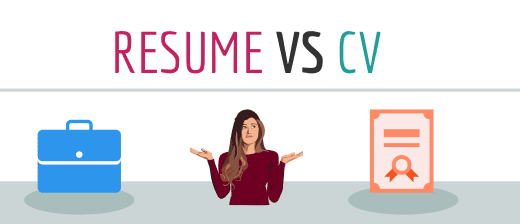Is there a difference between a CV and a resume? Yes, and it’s important. Read on for a breakdown of CVs vs. resumes, and when you’d want to submit each.
By: Katelyn Skye Bennett | Contributor for Let’s Eat, Grandma
Job seeker: know thy audience.
In most career fields, hiring managers want a standard, 1-2 page professional resume listing your work experience.
However, academia and research fields are the exceptions. Read job descriptions in those fields more carefully to see if they want a resume or CV (Curriculum Vitae) before applying.
But what’s the difference between them again?
The Difference Between a CV and a Resume
There is a difference between “CV” and “resume” and it’s important, especially in the U.S.
The Balance Careers explains the difference between resumes and CVs quite nicely. They state that (in the U.S.) resumes are competency-based, while CV’s are credential-based. Let’s break down what that means:
Resumes show your competency for a job with brief highlights of your employment history. They demonstrate your experience level, accomplishments, and professional skills.
CVs, on the other hand, show your credentials by providing a comprehensive list of educational and research experiences, publications/presentations, and affiliations/certifications in addition to your work history. That’s why they’re typically reserved for academic and research jobs.
Let’s Eat, Grandma is here to help you write a resume that portrays you as the best candidate for a specific job.
Yet we still need to talk about CVs. Read on for an infographic with key differences between a resume and CV,and further info on how a CV works.
(Quick note: “CV” here refers to an academic Curriculum Vitae. Some countries use the terms “CV” and “resume” interchangeably to refer to professional resumes. If you’re in the U.S., don’t.)
What Does CV Mean?
CV stands for “Curriculum Vitae, ” a fancy Latin phrase meaning “source of life.” A Curriculum Vitae includes different information than a resume to showcase different qualifications.
American University explains this further:
“The CV differs from a traditional resume in that it lists publications, professional presentations, classes taught, and other relevant academic information. While resume length is limited to one or two pages, the CV can grow with your career.”
A CV is lengthy; the supplemental research information often pushes it over 3 pages. That’s why it’s geared towards academic fields in the U.S. and isn’t useful for mainstream business positions.
But it’s not used often.
When Do I Need a CV?
Some graduate school applications may request a CV, but they may request your resume. Read the requirements carefully.
To further complicate matters, differently formatted CVs function as resumes for many international positions. That’s why “CV” and “resume” are often incorrectly used interchangeably!
International CVs may require more personal information than American ones, for example, but the preferred format may vary per job location.
Educate yourself on the country’s culture and expectations before completing your CV and applying – a recruiter may be able to advise you more specifically.

If you’re in business, engineering, nonprofits, the arts, or any other non-academic field in the U.S., stick with a standard 1-2 page resume. You might still include brief mentions of your publications, certifications, or presentations, but only prioritize what’s relevant for the job.
A resume is shorter, but it does the trick. It’s designed to just give a brief overview that will land you an interview, where you can go more in-depth. With your relevant job experience laid before the eyes of the hiring manager, ATS- friendly and typo-free, you’ll be on the road to success.
Need to cut your CV down to a concise resume? Schedule a free call with us to find out how our professional writers can rework your resume, cover letter, and LinkedIn profile to land you that dream job.

